Subscribe to our YouTube channel for the latest videos, updates, and tips.
Addition of Mixed Fractions
We will learn how to solve addition of mixed fractions or addition of mixed numbers. There are two methods to add the mixed fractions.
For example, add 235 and 1310.
We can use the two methods to add the mixed numbers.
Method 1:
|
235 + 1310 = (2 + 1) + 35 + 310 = 3 + 35 + 310 = 3 + 3×25×2 + 3×110×1, [L.C.M. of 5 and 10 = 10] = 3 + 610 + 310 = 3 + 6+310 = 3 + 910 = 3910 |
Step I: We add the whole numbers, separately. Step II: To add fractions, we take L.C.M. of the denominators and change the fractions into like fractions.
Step III: We find the sum of the whole numbers and the fractions in the simplest form. |
Method 2:
|
235 + 1310 = (5 × 2) + 35 + (10 × 1) + 310 = 135 + 1310 = 13×25×2 + 13×110×1, [L.C.M. of 5 and 10 = 10] = 2610 + 1310 = 26+1310 = 3910 = 3910 |
Step I: We change the mixed fractions into improper fractions. Step II: We take L.C.M. of the denominators and change the fractions into like fractions.
Step III: We add the like fractions and express the sum to its simplest form. |
Now let us consider some of the examples on addition of mixed numbers using Method 1.
1. Add 116 , 218 and 314
Solution:
116 + 218 + 314
Let us add whole numbers and fraction parts separately.
= (1 + 2 + 3) + (16 + 18 + 14)
= 6 + (16 + 18 + 14)
= 6 + 1×46×4 + 1×38×3 + 1×64×6; [Since, the L.C.M. of 6, 8 and 4 = 24]
= 6 + 424 + 324 + 624
= 6 + 4+3+624
= 6 + 1324
= 61324
2. Add 519, 2112 and 34.
Solution:
519 + 2112 + 34
Let us add whole numbers and fraction parts separately.
= (5 + 2 + 0) + (19 + 112 + 34)
= 7 + 19 + 112 + 34
= 7 + 1×49×4 + 1×312×3 + 3×94×9, [Since the L.C.M. of 9, 12 and 4 = 36]
= 7 + 436 + 336 + 2736
= 7 + 4+3+2736
= 7 + 3436
= 7 + 1718,
= 71718.
3. Add 56, 212 and 314
Solution:
56 + 212 + 314
Let us add whole numbers and fraction parts separately.
= (0 + 2 + 3) + 56 + 12 + 14
= 5 + 56 + 12 + 14
= 5 + 5×26×2 + 1×62×6 + 1×34×3, [Since, the L.C.M. of 6, 2 and 4 = 12]
= 5 + 1012 + 612 + 312
= 5 + 10+6+312
= 5 + 1912; [Here, fraction 1912 can write as mixed number.]
= 5 + 1712
= 5 + 1 + 712
= 6712
4. Add 358 and 223.
Solution:
Let us add whole numbers and fraction parts separately.
358 + 223
= (3 + 2) + (58 + 23)
= 5 + (58 + 23)
L.C.M. of denominator 8 and 3 = 24.
= 5 + 5×38×3 + 2×83×8, (Since, L.C.M. of 8 and 3 = 24)
= 5 + 1524 + 1624
= 5 + 15+1624
= 5 + 3124
= 5 + 1724.
= 6724.
Now let us consider some of the examples on addition of mixed numbers using Method 2.
1. Add 239, 116 and 223
Solution:
239 + 116 + 223
= (9×2)+39 + (6×1)+16 + (3×2)+23
= 219 + 76 + 83, (L.C.M. of 9, 6 and 3 = 18)
= 21×29×2 + 7×36×3 + 8×63×6
= 4218 + 2118 + 4818
= 42+21+4818
= 11118
= 376
= 616
2. Add212, 313 and 414.
Solution:
212 + 313 + 414
= (2×2)+12 + (3×3)+13 + (4×4)+13
= 52 + 103 + 174, (L.C.M. of 2, 3 and 4 = 12)
= 5×62×6 + 10×43×4 + 17×34×3, (Since, L.C.M. of 2, 3 and 4 = 12)
= 3012 + 4012 + 5112
= 30+40+5112
= 12112
= 10112
3. Add 358 and 223.
Solution:
358 + 223
Let us convert the mixed fractions into improper fractions.
= (8×3)+58 + (3×2)+23
= 298 + 83,
L.C.M. of denominator 8 and 3 = 24.
= 29×38×3 + 8×83×8, (Since, L.C.M. of 8 and 3 = 24)
= 8724 + 6424
= 87+6424
= 15124
= 6724.
Word Problem on Addition of Mixed Fraction:
The doctor advises every child to drink 312 litres of water in morning, 414 litres in the after noon and 12 litre before going to bed. How much water should a child drink every day?
Solution:
312 + 414 + 12
Let us add whole numbers and fraction parts separately.
= (3 + 4 + 0) + (12 + 14 + 12)
= 7 + (12 + 14 + 12)
L.C.M. of denominators 2, 4 and 2 = 4.
= 7 + 1×22×2 + 1×14×1 + 1×22×2, [Since, the L.C.M. of 2, 4 and 2 = 4.]
= 7 + 24 + 14 + 24
= 7 + 2+1+24
= 7 + 54
[Here, the fraction 54 can write as mixed number.]
= 7 + 114
= 814
Therefore, 814 litres of water should a child drink every day.
● Related Concepts
- Fraction of a Whole Numbers
- Representation of a Fraction
- Equivalent Fractions
- Properties of Equivalent Fractions
- Finding Equivalent Fractions
- Reducing the Equivalent Fractions
- Verification of Equivalent Fractions
- Finding a Fraction of a Whole Number
- Like and Unlike Fractions
- Comparison of Like Fractions
- Comparison of Fractions having the same Numerator
- Comparison of Unlike Fractions
- Fractions in Ascending Order
- Fractions in Descending Order
- Types of Fractions
- Changing Fractions
- Conversion of Fractions into Fractions having Same Denominator
- Conversion of a Fraction into its Smallest and Simplest Form
- Addition of Fractions having the Same Denominator
- Addition of Unlike Fractions
- Addition of Mixed Fractions
- Word Problems on Addition of Mixed Fractions
- Worksheet on Word Problems on Addition of Mixed Fractions
- Subtraction of Fractions having the Same Denominator
- Subtraction of Unlike Fractions
- Subtraction of Mixed Fractions
- Word Problems on Subtraction of Mixed Fractions
- Worksheet on Word Problems on subtraction of Mixed Fractions
- Addition and Subtraction of Fractions on the Fraction Number Line
- Word Problems on Multiplication of Mixed Fractions
- Worksheet on Word Problems on Multiplication of Mixed Fractions
- Multiplying Fractions
- Dividing Fractions
- Word Problems on Division of Mixed Fractions
- Worksheet on Word Problems on Division of Mixed Fractions
4th Grade Math Activities
From Addition of Mixed Fractions to HOME PAGE
Didn't find what you were looking for? Or want to know more information about Math Only Math. Use this Google Search to find what you need.
Recent Articles
-
5th Grade Circle Worksheet | Free Worksheet with Answer |Practice Math
Jul 10, 25 11:41 AM
In 5th Grade Circle Worksheet you will get different types of questions on parts of a circle, relation between radius and diameter, interior of a circle, exterior of a circle and construction of circl… -
Construction of a Circle | Working Rules | Step-by-step Explanation |
Jul 09, 25 01:29 AM
Construction of a Circle when the length of its Radius is given. Working Rules | Step I: Open the compass such that its pointer be put on initial point (i.e. O) of ruler / scale and the pencil-end be… -
Combination of Addition and Subtraction | Mixed Addition & Subtraction
Jul 08, 25 02:32 PM
We will discuss here about the combination of addition and subtraction. The rules which can be used to solve the sums involving addition (+) and subtraction (-) together are: I: First add -
Addition & Subtraction Together |Combination of addition & subtraction
Jul 08, 25 02:23 PM
We will solve the different types of problems involving addition and subtraction together. To show the problem involving both addition and subtraction, we first group all the numbers with ‘+’ and… -
5th Grade Circle | Radius, Interior and Exterior of a Circle|Worksheet
Jul 08, 25 09:55 AM
A circle is the set of all those point in a plane whose distance from a fixed point remains constant. The fixed point is called the centre of the circle and the constant distance is known
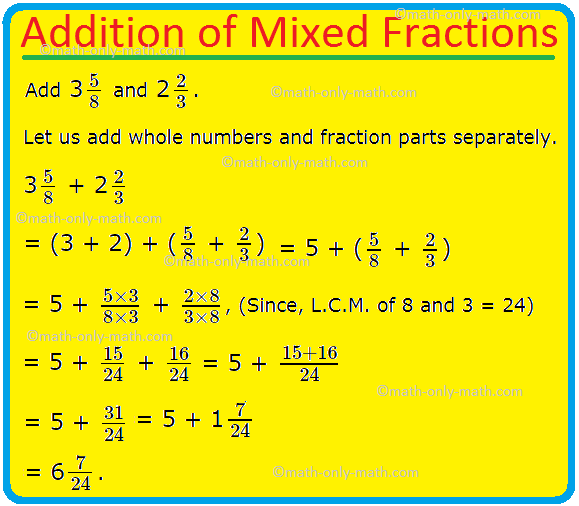

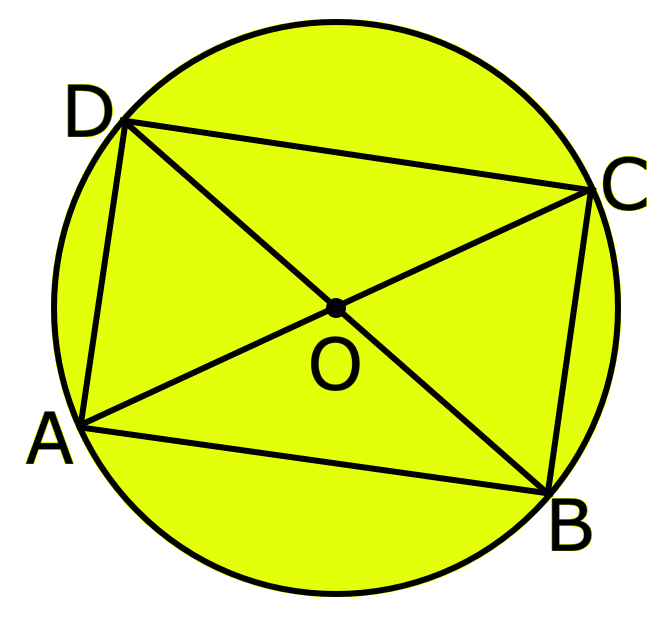
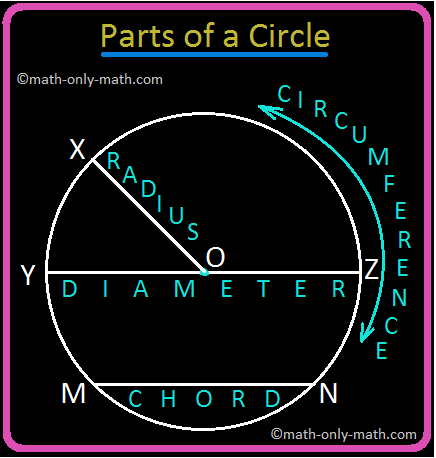
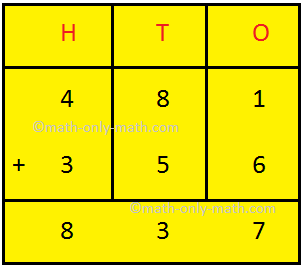
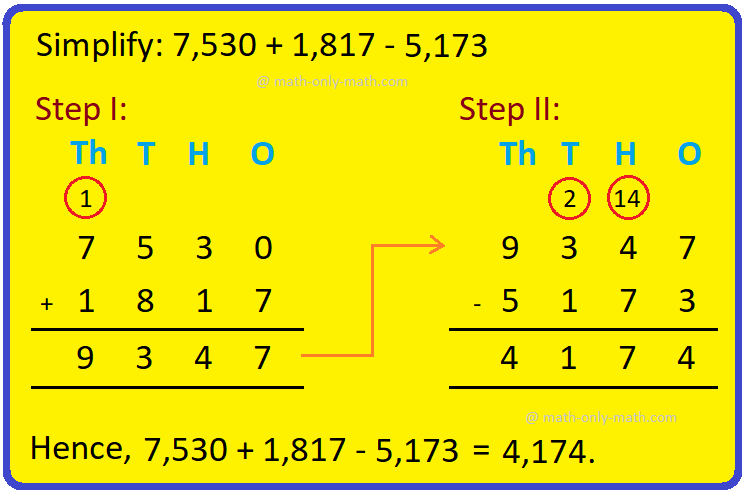
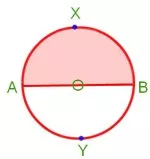
New! Comments
Have your say about what you just read! Leave me a comment in the box below. Ask a Question or Answer a Question.